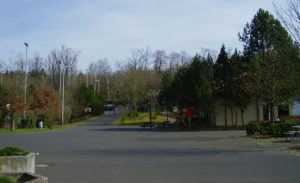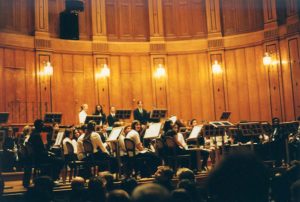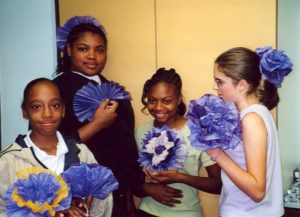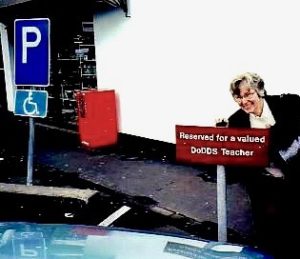 In 1997, I was delighted to receive a transfer to return to Germany after sixteen years away. In the interim, the Berlin Wall had come down, and East and West Germany were reunited. America was involved in conflicts in Bosnia and Korsovo, with parents deployed from Giessen. Improved telephone service and the Internet made communication with the States quick and inexpensive. When I began teaching in DoDDS, families whose children had special needs were not sent overseas; but educational trends had evolved since the cultural upheaval of the 1960’s to include mainstreaming of special needs students and the concept of IEPs.
In 1997, I was delighted to receive a transfer to return to Germany after sixteen years away. In the interim, the Berlin Wall had come down, and East and West Germany were reunited. America was involved in conflicts in Bosnia and Korsovo, with parents deployed from Giessen. Improved telephone service and the Internet made communication with the States quick and inexpensive. When I began teaching in DoDDS, families whose children had special needs were not sent overseas; but educational trends had evolved since the cultural upheaval of the 1960’s to include mainstreaming of special needs students and the concept of IEPs.
Until after I arrived, I didn’t discover the troublesome relationship between the school and community that existed in Giessen. The NCA report given in early 1998 stated that “there’s plenty of technology,…“discipline is a major concern,…[and] kids have little pride in the school”— facts most of the faculty well knew.
During the four school years I spent in Giessen, a number of changes improved the situation somewhat. Changes in DoDDS personnel, rotation back to the States of a number of problematic students and parents, rooms repainted and new carpeting installed, plus even a change in command of the military made a difference. The new commanding officer in 1999 attended assemblies to present academic and sports awards, ordered military parents to attend the school’s Open House, actually sending a soldier to take roll, and authorized a Reserved Parking Space at the front door of the exchange for “A Valued DoDDS Teacher.”
The school was a fairly modern building located in a park-like setting, convenient to one of the housing areas. Instead of bells to signal class changes, Giessen used chimes. Enrollment, about 200, was small compared to most DoDDS schools in Germany at the time. During my four years there, I taught varying schedules of Beginning and Second Year Spanish, English 9 and 12, and Beginning and Second Year French. A traditional seven-period day was used from 1997 to 1999. Then in September 1999, we began using block scheduling.
We really did have a lot of technology. The administration arranged a number of faculty training days and all teachers were urged to use the computer lab with students. I’ll admit to some resistance due to what I perceived as a conflict in outcomes. DoDDS wanted us to emphasize verbal foreign language acquisition while computers focus on reading and writing language skills. As for report cards, there were some shifts to different computer programs, so teachers had options to either fill out computer scan sheets or enter grades directly onto the computer system.
DoDDS declared that teachers would be allowed to use email for personal communications with family and friends as a morale booster, but we were warned against using it for business purposes and told that officially all messages were property of the government just as any records we made, even informally, about students and parent conferences belonged to the school, not the teacher.
Some of the notable extra-curricular activities included the Hessen District Middle School Writing Symposium. Along with other DoDDS teachers, I presented a lesson on Show; Don’t Tell which I had developed since my training in the DoDDS Writing Assessment program in Italy. A children’s author also spoke as a special guest.
An annual District-wide Foreign Language Competition was held in Heidelberg during which students recited poetry, made impromptu speeches, competed in vocabulary bees, and were judged on pronunciation and fluency as well as knowledge of Spanish, French, and German. The event concluded each year with school teams competing in a Culture Bowl.
In 1999, nine Giessen students participated in the European Honors Music Festival, with three seated in first chairs, two in second chairs, and the Giessen music director conducting. To be selected for participation, each student submitted a tape recording of themselves playing selected music. A final concert was presented to the German community in Bad Kissingen, performed in the Regentenbau Konzerthalle built by the Bavarian King Ludwig III.
In my language classes, we celebrated either Cinco de Mayo or el Día de los Muertos and Mardi Gras. The annual Field Day was fashioned on a German Volksfest. One year students presented an outstanding assembly during Black History Month, and DoDDS sent a number of special speakers for our other assemblies.
While schools often close for a few days or start late due to snowy weather, Giessen delayed classes at one time due to “mad cow disease.” The epidemic was spreading across Europe, so Germans quarantined villages where it occurred. Eventually, they allowed cars to leave after driving through vats of disinfectant, but even that upset commuters’ schedules.
Americans in Giessen could explore some little-known German history in the environs. The Brothers Grimm collected their fairy tales from the surrounding area. The Miller Theater where the junior high classes once met had originally been a Luftwaffe Officers’ Club, and some teachers claimed it was still inhabited by ghosts when they taught there. During WWII, pilots bombing Berlin were told to “save one for Giessen” which was an important railroad terminal. Some of our students were housed in nearby Wetzlar, formerly a refugee processing center after WWII, and others rode buses up from Bad Nauheim, General George S. Patton’s final military assignment, and from Friedberg where Elvis Presley had served in the Army. Both Friedberg and Bad Nauheim have designated an Elvis Presley Platz in their towns and hold Elvis Festivals each August on the anniversary of his death.
In June, 2001, thirty-two years, seven countries, and ten schools after my first assignment in the DoDDS community, I retired. I had seen numerous changes in educational philosophy and policy as well as technological changes in how we taught. I had collected boxes full of photos, journals, letters, mementos, and souvenirs while developing a unique perspective on American life. The memoir I eventually wrote and published in 2009 (Not in Kansas Anymore) was my attempt to reply to the one question my colleagues and my students so often struggled to answer: “You have such diverse attitudes, habits, and vocabulary, such unusual likes and dislikes, friendships and possessions—just where do you come from anyway?”
The regimented American military lifestyle gave us structure and roots. But the frequent moves, adapting to foreign cultures as well as to new schools, making new friends—all trained us to be flexible and open-minded. My career with DoDDS is a treasure I hold dear for it fulfilled a childhood dream to travel and it enriched my perspective of the world.
Click an image to see a larger version in a new browser tab (or window).





